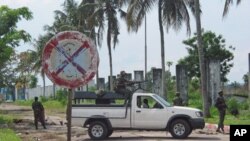Activists in the United States are organizing events this week to bring attention to the ongoing war in the Democratic Republic of Congo. The efforts are part of a wider movement to help victims and try to bring about change from a distance.
Kanda Bongo Man, a musician from the Democratic Republic of Congo, kicked off events this week in Harlem, New York, as part of what is being called "Breaking the Silence: Congo Week."
The student coordinator of a group called Friends of the Congo, Kambale Musavuli, explains the importance of dozens of events across the United States and in other countries that will range from running races to conferences.
'Breaking the Silence'
"I think it is a responsibility for humanity to care for one another, that is one basic reason," said Musavuli. "A second is that it is the greatest conflict in the world since World War II, the deadliest conflict since World War II. It will take the support of ordinary people around the world, especially the United States, because it has a lot of leverage in bringing about peace in the Congo and we know that ordinary people can do that since they did it 100 years ago."
Musavuli points to the historical role of Americans like author Mark Twain and former American slave Booker T. Washington as precedence. In the early 1900s, they helped lead a mass movement to end atrocities in the Congo. At the time, Belgium's King Leopold had made the Congo his private property and had built a fortune through rubber plantations.
In 1908, the Belgian parliament compelled the king to cede Congo to Belgium, and the worst of the atrocities ended.
Musavuli said today regular Americans can ask their local councils to write resolutions for peace in the Congo, while starting their own Internet campaigns. That way, he said, the issue will be on everyone's mind.
'Congo Week'
The week-long activities come amid growing activism by U.S groups pointing out how the sale of cellphones and laptops, made with some of Congo's minerals, helps fuel Congo's conflict. They also have protested against the use of child soldiers and widespread rape. Between five and six million people are estimated to have been killed in Congo's war in the past 14 years, which also has involved neighboring countries.
In eastern Congo, the region where war persists, different armies, militia groups, rebels and companies have been competing to profit from the region's mineral wealth, while local populations try to survive in dismal conditions.
One U.S. group has been organizing a tour of campuses and coffee shops - called "Falling Whistles" - to advocate for peace.
Advocacy coordinator Monique Beadle says the whistles are a double metaphor to bring attention to child soldiers too young to hold weapons who are sent to the frontlines wearing only whistles, and to so-called whistleblowers in Congo, who refuse to remain silent.
"There are brave women and men on the ground who are risking their lives everyday and standing up for peace in their own communities so we blow this whistle in protest against the war and also in solidarity," said Beadle.
Shedding light on the conflict
Beadle calls on participants who attend Congo protests to start their own protests, and use whatever skills they have to bring attention to the conflict. "Falling Whistles" sells replicas of the whistles child soldiers are forced to wear, and sends proceeds to rehabilitation programs in the Congo.
Beadle said she believes activism from outside eventually can help those trying to make a difference from within the Congo prevail.
"A lot of times we hear from people that it is an intractable problem and there is just no way that Congo can be at peace," said Beadle. "It is too big. But we simply don't believe that it is the case. We have met too many Congolese people, some visionaries, civil society leaders, reformers, who really have the potential and the vision and ideas to make for peace on the ground, and all that they really need is our awareness and our support and solidarity."
Other suggestions that activists have been making are for the United States government to cut aid to neighboring countries found meddling in the Congo, as well as devoting more diplomatic energy to ending the conflict. They also want to see all companies selling electronic goods in the United States certify their products are free of conflict minerals.





